In terms of my reading plans for 2025, mentally laid out at the end of last month, this read was a totally unexpected curveball. The book (and author) wasn’t one I’d ever heard of, and not one I’d have bothered to pick up even on a free rack; but it was a surprise Christmas gift from a library colleague, delivered early this month when we returned from Christmas break, and one that touched me deeply. As a gift from one librarian to another, it actually has a lot to commend it, being very library-centered and with a message very supportive of books and the importance of the written word.
Written for younger readers (ages 10-14, according to the Goodreads description), this is the opening book of what’s so far a duology. Author Downey describes the premise and genesis of the series in an answer to a question by another Goodreader, which is worth quoting from at length:
“I think the seed for the series was planted when I saw the phrase “Petrarch’s Library” scrawled on a notebook I found in our never-very-organized, and always-very-clutterful house. Everyone in the family denied being the scrawler, but the phrase ignited my imagination, especially after I looked it up and found it associated with a collection of books that the 14th century humanist and poet, Petrarch, had carried around with him when he traveled on the back of a donkey. That made me laugh, because the phrase had suggested some sort of grand magnificent library. But then I thought, well, even a small collection of books IS a sort of imaginary grand magnificent place because each of the books is a doorway into a different world of ideas, and knowledge, and story.
Suddenly I was imagining “Petrarch’s Library” as a solid, if sprawling building, made out of library chambers from different times and places knitted together by magic into one incredible super-library.
Since I was a kid, I always had the feeling that librarians were masquerading at doing something mundane while actually doing something incredible, mysterious and magical. It seemed reasonable that the work of librarians who staffed the imaginary Petrarch’s Library would defend and protect the flow of information in shall we say, some additional warrior-ish direct action ways!”
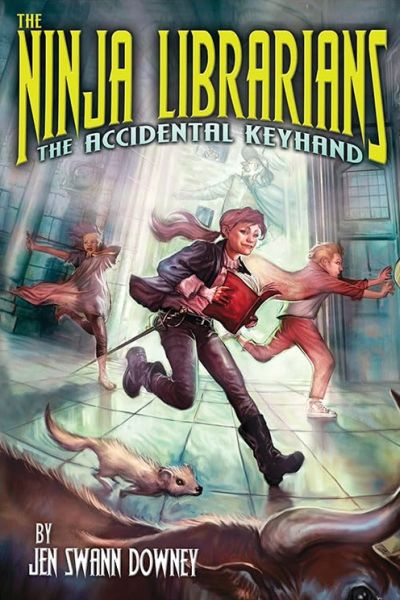 (That quote also answers the question of whether this is fantasy or science fiction; that would depend on whether the author intended us to view the speculative elements as enabled by magic –which, as noted above, she did!– or by natural phenomena/technology unknown to present science.) 12-year-old protagonist Dorothea “Dorrie” Barnes is a library-loving kid growing up in Passaic, New Jersey (I suspect this might be Downey’s hometown, but can’t confirm that), in a chaotic household with her inventor father, college instructor mom, 14-year-old brother Marcus, and three-year-old sister Miranda. (The family shares the house with her great-aunt Alice, who’s an anthropologist.) Dorrie’s a pretty ordinary tween, albeit one with a sense of justice and a liking for the idea of sword-fighting against villains; she’s got a blunt practice sword and takes a library-sponsored fencing and stage combat class. But when the book opens on the day of the library’s annual Pen and Sword Festival (a sort of low-budget Renaissance Faire), a succession of freak events will very soon suck Dorrie and Marcus into a most un-ordinary experience….
(That quote also answers the question of whether this is fantasy or science fiction; that would depend on whether the author intended us to view the speculative elements as enabled by magic –which, as noted above, she did!– or by natural phenomena/technology unknown to present science.) 12-year-old protagonist Dorothea “Dorrie” Barnes is a library-loving kid growing up in Passaic, New Jersey (I suspect this might be Downey’s hometown, but can’t confirm that), in a chaotic household with her inventor father, college instructor mom, 14-year-old brother Marcus, and three-year-old sister Miranda. (The family shares the house with her great-aunt Alice, who’s an anthropologist.) Dorrie’s a pretty ordinary tween, albeit one with a sense of justice and a liking for the idea of sword-fighting against villains; she’s got a blunt practice sword and takes a library-sponsored fencing and stage combat class. But when the book opens on the day of the library’s annual Pen and Sword Festival (a sort of low-budget Renaissance Faire), a succession of freak events will very soon suck Dorrie and Marcus into a most un-ordinary experience….
With 358 pages of actual text, this is a rather thick book; but it has fairly large script, and is a quick-flowing page turner. Given that it’s intentionally written for kids, it’s safe to say (and no disgrace to the author!) that it would appeal more to that group than to adults; and while it’s among those children’s books that can please adults, it’s much more towards the younger-age end of that spectrum than some. Probably its biggest problem is conceptual murkiness, which makes suspension of disbelief challenging (more so for adults than for most 10-14 year-olds). The circumstances behind the rise of the Foundation and later of its Lybrariad adversaries aren’t really explained, and neither is the power behind the magic of Petrarch’s library and why its details work the way they do (partly because the Lybrarians themselves don’t know or understand this!). Because the author conceives of time as fluid, with past events subject to change which can re-write subsequent ones, time paradoxes are a factor, and that’s definitely not my favorite time-travel trope. Also, Downey’s perspective is secular humanist, though the book doesn’t stress this. The issue of language differences in certain settings isn’t always handled convincingly, IMO.
However, there are definite pluses here as well. On the whole, the plot is a serious one, with real suspense and tension in many places and a definite potential risk of death at times, and there are some serious life lessons imparted and significant moral choices made; but the author leavens this with a good deal of both situational and verbal humor, which works well here. She’s obviously well-read and knowledgeable about history, geography, natural history, etc., and she constructs her plot well for the most part (though there’s a significant logical hole in the part played by one magical artifact). Dorrie’s well-developed and likeable; most of the other characters who get any significant page-time are well-developed also, though not always likeable nor meant to be. (Marcus is, though you might sometimes want to swat him! :-) ) A nice touch is the incorporation of several real historical figures, such as Cyrano de Bergerac and Greek philosopher Hypatia, as members of the Lybrariad, though their portrayal isn’t always necessarily realistic. (I appreciated the short appendices which identify most of these people, and give additional information about other real persons, places, books, and other items mentioned in the tale.)
Since Dorrie is only 12 years old, she’s not a very formidable fighter in serious combat. But within the limits of her physical growth and of what training she’s had, she actually does display some action heroine chops, albeit not until quite a ways into the book.
All in all, this is not deep fiction, and I don’t plan to seek out the sequel. But it’s an enjoyable romp on its own terms, and I don’t regret reading it. (Note for animal-loving readers: the pet mongoose who plays an important role in the storyline is not harmed in any way!)
Author: Jen Swann Downey
Publisher: Sourcebooks, available through Amazon, both for Kindle and as a printed book.
A version of this review previously appeared on Goodreads.
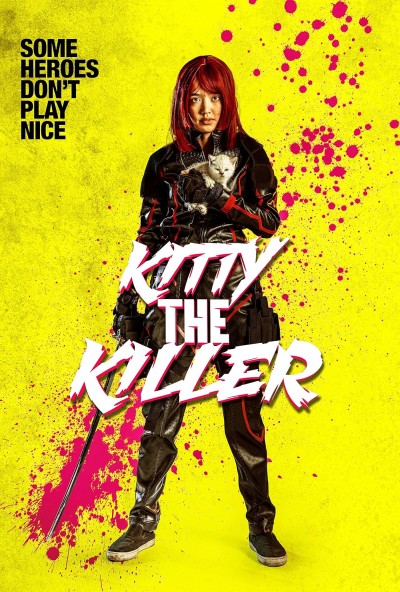 The easiest way to describe this is a Thai version of Wanted. You could make a case that the central character is not female. But like Wanted, there’s easily enough going on around him to qualify for this site. The similarities don’t stop there either. In both films, you have an innocent, totally unaware office worker, who is recruited into an ancient order of super assassins, just as they are going to war. Here, the rookie is Charlie (Ngamnet), an insurance salesman – sorry, he’s a sales manager, as he would no doubt correct you – who is caught up in the affairs, and eventually becomes a member, of a lethal organization known only as The Agency.
The easiest way to describe this is a Thai version of Wanted. You could make a case that the central character is not female. But like Wanted, there’s easily enough going on around him to qualify for this site. The similarities don’t stop there either. In both films, you have an innocent, totally unaware office worker, who is recruited into an ancient order of super assassins, just as they are going to war. Here, the rookie is Charlie (Ngamnet), an insurance salesman – sorry, he’s a sales manager, as he would no doubt correct you – who is caught up in the affairs, and eventually becomes a member, of a lethal organization known only as The Agency.




 (That quote also answers the question of whether this is fantasy or science fiction; that would depend on whether the author intended us to view the speculative elements as enabled by magic –which, as noted above, she did!– or by natural phenomena/technology unknown to present science.) 12-year-old protagonist Dorothea “Dorrie” Barnes is a library-loving kid growing up in Passaic, New Jersey (I suspect this might be Downey’s hometown, but can’t confirm that), in a chaotic household with her inventor father, college instructor mom, 14-year-old brother Marcus, and three-year-old sister Miranda. (The family shares the house with her great-aunt Alice, who’s an anthropologist.) Dorrie’s a pretty ordinary tween, albeit one with a sense of justice and a liking for the idea of sword-fighting against villains; she’s got a blunt practice sword and takes a library-sponsored fencing and stage combat class. But when the book opens on the day of the library’s annual Pen and Sword Festival (a sort of low-budget Renaissance Faire), a succession of freak events will very soon suck Dorrie and Marcus into a most un-ordinary experience….
(That quote also answers the question of whether this is fantasy or science fiction; that would depend on whether the author intended us to view the speculative elements as enabled by magic –which, as noted above, she did!– or by natural phenomena/technology unknown to present science.) 12-year-old protagonist Dorothea “Dorrie” Barnes is a library-loving kid growing up in Passaic, New Jersey (I suspect this might be Downey’s hometown, but can’t confirm that), in a chaotic household with her inventor father, college instructor mom, 14-year-old brother Marcus, and three-year-old sister Miranda. (The family shares the house with her great-aunt Alice, who’s an anthropologist.) Dorrie’s a pretty ordinary tween, albeit one with a sense of justice and a liking for the idea of sword-fighting against villains; she’s got a blunt practice sword and takes a library-sponsored fencing and stage combat class. But when the book opens on the day of the library’s annual Pen and Sword Festival (a sort of low-budget Renaissance Faire), a succession of freak events will very soon suck Dorrie and Marcus into a most un-ordinary experience….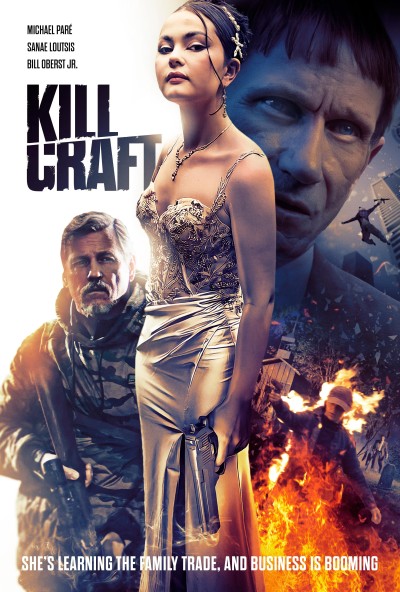 There is potential in the idea here. It’s a shame it ends up feeling like two separate movies, both of which come out feeling under-cooked. The main focus is on Marina Delon (Loutsis), a teenage girl with the typical teenage girl problems, e.g. bickering parents, generally sullen demeanour, etc. Except, her dad Thomas (Paré) is actually an assassin, working for the very strange Poe (Oberst). This has contributed to the marital strife, because his work is why mom is in a wheel-chair – and is not happy about it, to put it mildly. However, things are up-ended after Thomas is killed on a job, and Marina decides to take over the family business.
There is potential in the idea here. It’s a shame it ends up feeling like two separate movies, both of which come out feeling under-cooked. The main focus is on Marina Delon (Loutsis), a teenage girl with the typical teenage girl problems, e.g. bickering parents, generally sullen demeanour, etc. Except, her dad Thomas (Paré) is actually an assassin, working for the very strange Poe (Oberst). This has contributed to the marital strife, because his work is why mom is in a wheel-chair – and is not happy about it, to put it mildly. However, things are up-ended after Thomas is killed on a job, and Marina decides to take over the family business.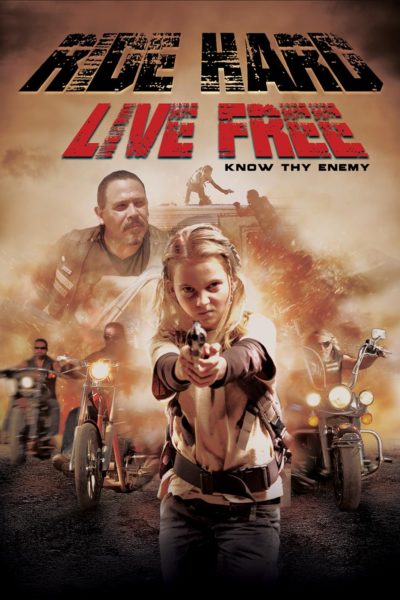 I was a little nervous on reading the IMDb trivia section: “Three motorcycle clubs participated as extras and offered technical advice.” If this sucked and I gave it a bad review, would I get a visit from a group of annoyed bikers, offering me ‘technical advice’ with a wrench? Turns out I needn’t have worried. While low-budget by Hollywood standards, it has some interesting ideas, and the execution is competent enough to pass muster. The events here take place after the collapse of the United States, when everywhere West of the Mississippi has basically been left to fend for itself. In this part of Nevada, that means two biker gangs, the Skoners and the Gypsies are fighting for control.
I was a little nervous on reading the IMDb trivia section: “Three motorcycle clubs participated as extras and offered technical advice.” If this sucked and I gave it a bad review, would I get a visit from a group of annoyed bikers, offering me ‘technical advice’ with a wrench? Turns out I needn’t have worried. While low-budget by Hollywood standards, it has some interesting ideas, and the execution is competent enough to pass muster. The events here take place after the collapse of the United States, when everywhere West of the Mississippi has basically been left to fend for itself. In this part of Nevada, that means two biker gangs, the Skoners and the Gypsies are fighting for control.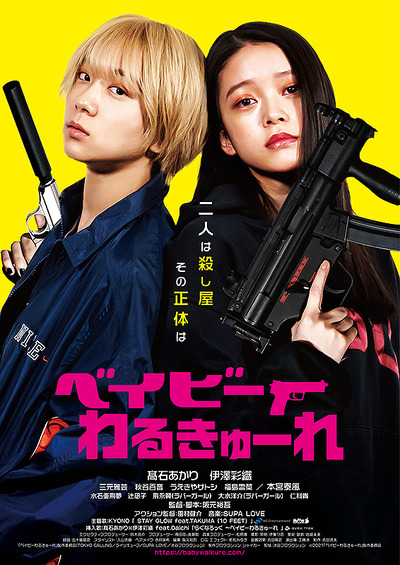 I’ve read complaints that the trailer mis-sells this, over-hyping the action components. Fortunately, I went in largely blind, so had no such preconceptions. I can see how it could be fair comment: while bookended by solid action, the middle is much more an oddball Japanese comedy. [If you’d told me this was directed by Sion Sono, I’d believe you] I still found it largely engaging, while occasionally hilarious and – sometimes simultaneously – utterly baffling. It’s about two teenage assassins, Chisato (Takaishi) and Mahiro (Izawa), who have been told by their handler they need to start fending for themselves. That means moving into an apartment, and finding work which doesn’t involve killing people.
I’ve read complaints that the trailer mis-sells this, over-hyping the action components. Fortunately, I went in largely blind, so had no such preconceptions. I can see how it could be fair comment: while bookended by solid action, the middle is much more an oddball Japanese comedy. [If you’d told me this was directed by Sion Sono, I’d believe you] I still found it largely engaging, while occasionally hilarious and – sometimes simultaneously – utterly baffling. It’s about two teenage assassins, Chisato (Takaishi) and Mahiro (Izawa), who have been told by their handler they need to start fending for themselves. That means moving into an apartment, and finding work which doesn’t involve killing people.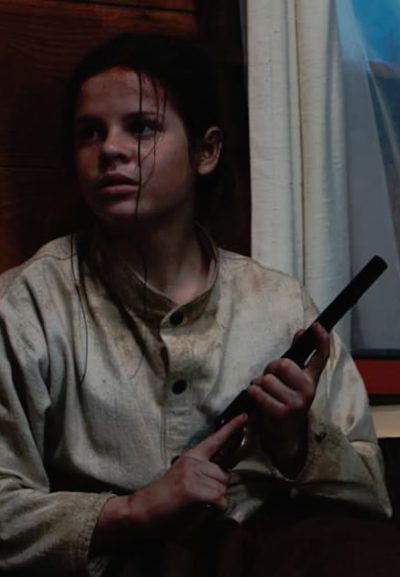 This one does take a while to reach the necessary threshold: probably only truly qualifies for the final twenty minutes or so, though it does talk a good game until that point. Also, it’s a decent enough combination of Western and home-invasion genres to that point, to pass muster. Nothing special, mind you. It just knows its limitations and is careful enough to work within them. It takes place in the Old West. whee Beth (Bernadette) and her twin children, Brian and Irene (Betsy) now live with her new husband, Robert (Krause). The trio appear to have escaped an abusive relationship, and it’s not long after a railroad surveyor pays a visit, before Irene is cheerfully telling him, she’s going to go back and kill her father some day.
This one does take a while to reach the necessary threshold: probably only truly qualifies for the final twenty minutes or so, though it does talk a good game until that point. Also, it’s a decent enough combination of Western and home-invasion genres to that point, to pass muster. Nothing special, mind you. It just knows its limitations and is careful enough to work within them. It takes place in the Old West. whee Beth (Bernadette) and her twin children, Brian and Irene (Betsy) now live with her new husband, Robert (Krause). The trio appear to have escaped an abusive relationship, and it’s not long after a railroad surveyor pays a visit, before Irene is cheerfully telling him, she’s going to go back and kill her father some day.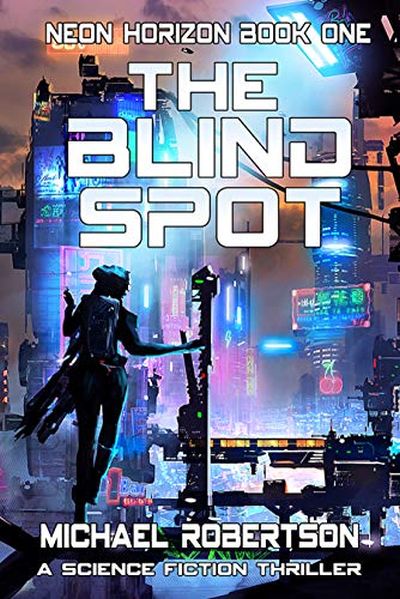 On the surface, Scala City is an idyllic, hi-tech world of prosperity, peace and morality, albeit at the cost of omnipresent surveillance of its residents. But there’s a dirty little secret. The Blind Spot is an area where surveillance is barred, and where the citizens of Scala City go to blow off their sordid steam. Its residents have cybernetically enhanced bodies, something rejected by Scala City, and a zero-tolerance policy for any kind of monitoring. It’s run by Wrench, who has kept his daughter Marcie Hugo under strict control since the death of her mother. However, like all teenagers, the 16-year-old Marcie is seeking to spread her wings, and has been making covert excursions into Scala City, with the aim of moving there some day soon.
On the surface, Scala City is an idyllic, hi-tech world of prosperity, peace and morality, albeit at the cost of omnipresent surveillance of its residents. But there’s a dirty little secret. The Blind Spot is an area where surveillance is barred, and where the citizens of Scala City go to blow off their sordid steam. Its residents have cybernetically enhanced bodies, something rejected by Scala City, and a zero-tolerance policy for any kind of monitoring. It’s run by Wrench, who has kept his daughter Marcie Hugo under strict control since the death of her mother. However, like all teenagers, the 16-year-old Marcie is seeking to spread her wings, and has been making covert excursions into Scala City, with the aim of moving there some day soon.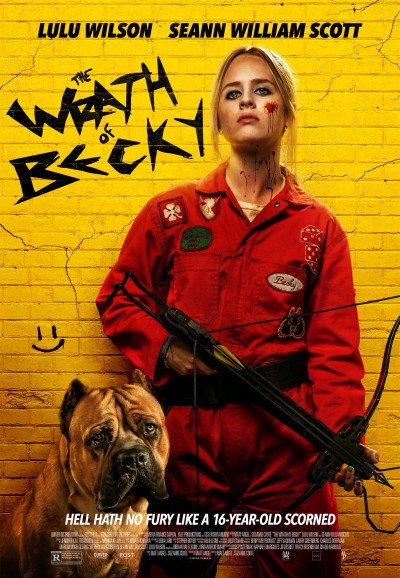 Don’t mess with someone else’s dog. This is a good rule of thumb in most cases, but especially so when the owner is an unhinged teenage psychopath, with the both the talent and desire to inflict carnage in retribution. The
Don’t mess with someone else’s dog. This is a good rule of thumb in most cases, but especially so when the owner is an unhinged teenage psychopath, with the both the talent and desire to inflict carnage in retribution. The 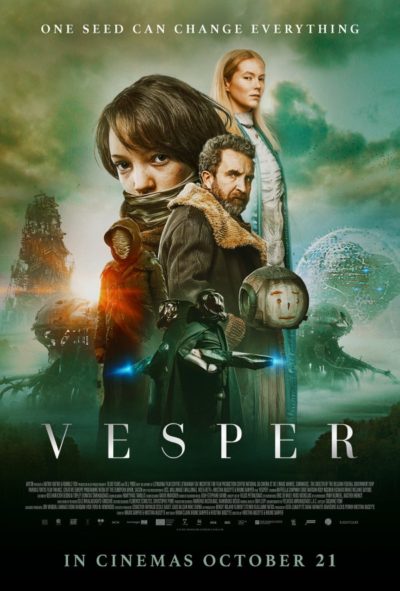 As the above suggests, I was getting a strong manga influence, in particular from the works of Hayao Miyazaki: it feels like the script could have been something he’d have written on a gloomy Wednesday in January. Feisty teenage heroine? Check? Ecological message? Check. For this takes place after some kind of change in the world, which has left the bulk of the population clinging on to existence by their grubby fingernails, in a world now owned by bizarre flora. Vesper (Chapman) is one such, tending to her paralyzed father (Brake) whose consciousness has been transferred into a drone. She trades with her uncle, Jonas (Marsan), swapping blood for the seeds they need to survive.
As the above suggests, I was getting a strong manga influence, in particular from the works of Hayao Miyazaki: it feels like the script could have been something he’d have written on a gloomy Wednesday in January. Feisty teenage heroine? Check? Ecological message? Check. For this takes place after some kind of change in the world, which has left the bulk of the population clinging on to existence by their grubby fingernails, in a world now owned by bizarre flora. Vesper (Chapman) is one such, tending to her paralyzed father (Brake) whose consciousness has been transferred into a drone. She trades with her uncle, Jonas (Marsan), swapping blood for the seeds they need to survive.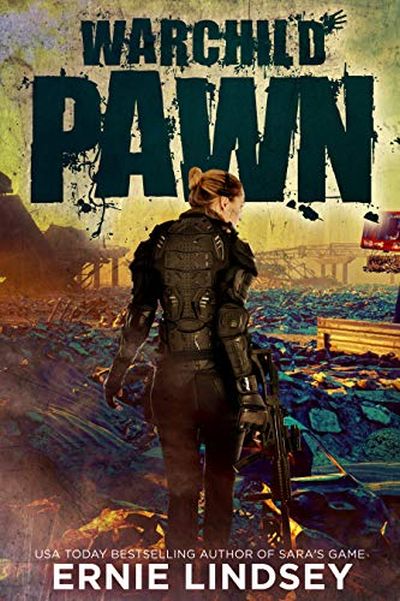 This dystopian future takes place after the United States of America is no longer united, having fragmented into a group of disparate regions that exist in an uneasy piece with each other. The heroine is 14-year-old Caroline, who lives in a remote part of the Appalachians, her town loosely affiliated to the People’s Republic of Virginia. She’s a scout, and one day encounters forces from the Democratic Alliance. The population of her village who escape, head towards the state capital of Warrenville, pursued by the invading army. On the way, Caroline begins to come into startling abilities which were literally injected into her as a small child.
This dystopian future takes place after the United States of America is no longer united, having fragmented into a group of disparate regions that exist in an uneasy piece with each other. The heroine is 14-year-old Caroline, who lives in a remote part of the Appalachians, her town loosely affiliated to the People’s Republic of Virginia. She’s a scout, and one day encounters forces from the Democratic Alliance. The population of her village who escape, head towards the state capital of Warrenville, pursued by the invading army. On the way, Caroline begins to come into startling abilities which were literally injected into her as a small child.